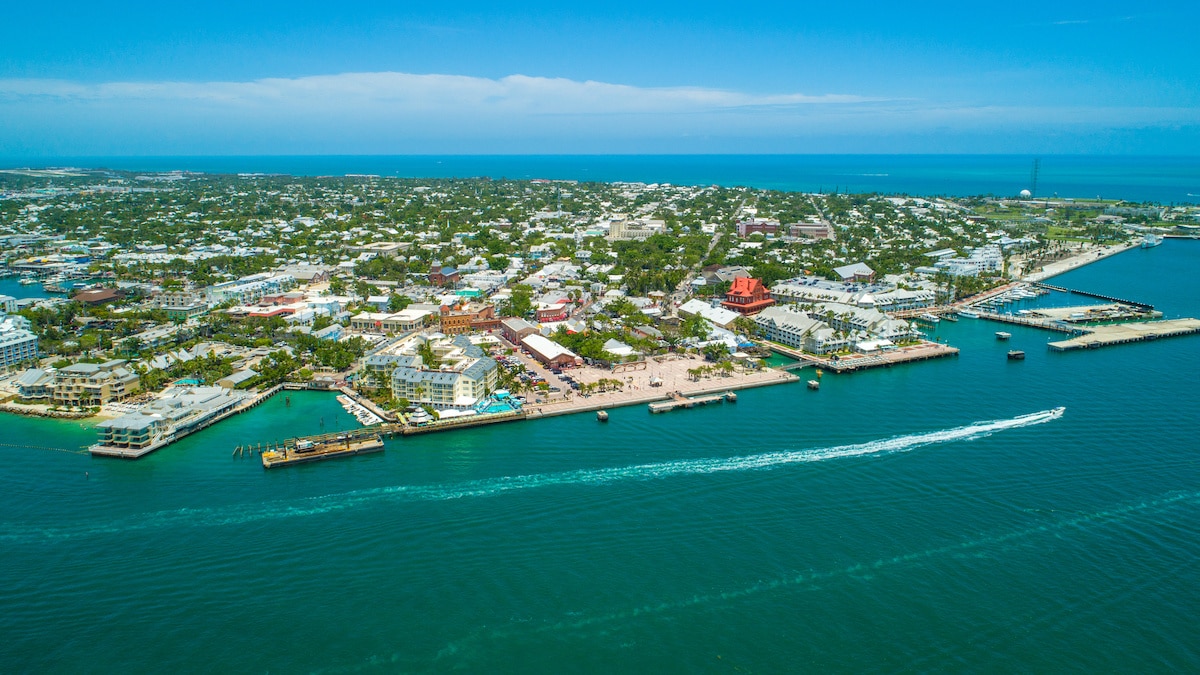

Key West voters have passed three ballot initiatives to limit the impact of visiting cruise ships on island life and fragile marine habitats. felixmizioznikov / iStock / Getty Images Plus
Despite being a well-known port of call on the Caribbean cruise circuit, the City of Key West voted to ban large cruise ships from visiting and to restrict foot traffic from vessels. Supporters and opponents disagreed about the safety, environmental and economic merits of the proposals.
On election day, local voters passed three ballot initiatives to limit the impact of visiting cruise ships on island life and fragile marine habitats. According to the local Board of Elections, 63% of residents voted to ban ships with capacities larger than 1,300 passengers from docking at all; 61% voted to limit the total daily number of passengers disembarking to 1,500; and 81% supported a measure that prioritizes cruise lines with the best environmental and health records to fill those 1,500 slots.
The referenda are effective immediately and binding but are expected to be challenged in court, reported The Points Guy and USA TODAY.
According to the Key West Committee for Safer, Cleaner Ships (SCS), who spearheaded the effort, a cruise line’s environmental record will be determined by the number of environmental violations, penalties and fines accumulated. Health scores will be determined under the Center for Disease Control and Prevention’s Vessel Sanitation Program.
“For decades, the City of Key West has done nothing to regulate cruise ships, despite growing local frustrations with the threats large cruise ships pose to the environment, quality of life and sustainable economic growth,” SCS treasurer and outspoken opponent of large ships Arlo Haskell explained to EcoWatch. “The fact that cruise ships now pose a clear risk to public health due to Covid-19 was, for us, the last straw.”
Cruise ships often damage the environment. In addition to creating vast amounts of waste and carbon emissions, they also degrade nearby habitats.
Surfrider Florida Keys (SRFK) supported the three initiatives to “give our coral reefs and marine environment a voice,” said vice-chair Whitney Wemett. The local coral reefs serve as vital nursery grounds, aggregation spots, habitat and food source for many marine species, she noted.
According to Haskell, the Key West port is narrow, shallow and long. It’s also located right next to part of the only barrier coral reef in the country, the survival of which is dependent upon clean, clear water. Transiting cruise ships stir up silt from the seafloor and create “chronic turbidity” lethal to sea life. SRFK chair Shawn Martin hopes the exclusion of bigger ships will reduce not just the sediment plumes of silt over the reef but also pollution from human sewage, greywater and plastic waste.
“Limiting the type and size of cruise ships coming into port will lessen the stress on the ocean ecosystem and be a step in the right direction for improving water quality — a crucial element to healthy reefs,” Martin told EcoWatch.
Local restaurant owner and opponent of the cruise ship prohibitions Bill Lay agreed on the need to protect the environment but asserted that the initiatives were the wrong way to do it.
“CSC used the cover of Covid-19 as a tool, a once-in-a-lifetime opportunity to get rid of ships,” he said. “But, economically, you’re taking a community devastated by the pandemic and just throwing salt on the wound. Our local businesses need foot traffic from the cruise ships.”
While his two restaurants do not serve cruise passengers because they’re only open for dinner, Lay predicted he and other business owners like him would feel the “domino effect” of the tightened regulations as locals whose businesses do rely on cruise traffic shutter.
The Key West Chamber of Commerce similarly estimated that eliminating the cruise industry will cost the island million in lost jobs and income, reported WLRN.
Haskell presented the economics differently, calling the idea that large cruise ships are essential to Key West’s economy a “myth propagated by the cruise industry.” While cruise ship passengers account for 50% of all visitors to Key West, they represent less than 8% of tourist spending, because most of their money is spent onboard the ship, he said.
“The meager economic benefit in Key West is simply not worth the profound risk posed by large cruise ships,” he said.
“If these reefs die, so too do the industries that rely on them,” Martin added. “If we do not put the health of our coral reefs first, there will be no Key West tourist economy.”
“We can’t afford to be shortsighted, and this move was one geared towards a strong and vibrant future for Key West,” Wemett concluded.
The committee is eager to work with the cruise industry to bring qualifying small ships to Key West. Haskell asserted that a true solution would need to be about “balance” between environment and economy, with an eye on long-term economic sustainability without environmental degradation.
- Leading Cruise Lines Face Lawsuits Following Handling of COVID ...
- Thousands of Ships Use 'Cheat Devices' to Dump Toxic Wastewater ...
- Environmental Report Card Grades Cruise Ships - EcoWatch
- Coral Rescue Team Races to Save Endangered Corals From ...
- New Ecolabel to Certify ‘Whale-Safe’ Shipping Companies and Cruise Lines

 233k
233k  41k
41k  Subscribe
Subscribe 